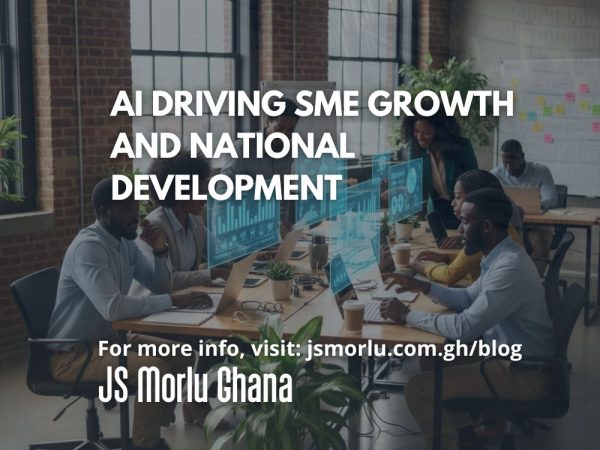Small and Medium-Scale Enterprises (SMEs) are the heartbeat of emerging economies fueling innovation, creating jobs, and driving GDP growth. In Ghana, over 90 percent of businesses fall into this category, contributing nearly 60 percent of GDP and employing about 80 percent of the workforce. Clearly, SMEs aren’t just participants in national development they are the engine behind it.
But as the business landscape evolves, one force is reshaping how these enterprises operate and compete: Artificial Intelligence (AI).
The Modern SME Landscape
According to the Ghana Enterprises Agency, SMEs typically employ fewer than ten workers and maintain assets under GHS 10 million. They thrive across industries from agriculture to manufacturing and tourism yet face familiar hurdles: limited access to capital, regulatory red tape, and market volatility.
In today’s fast-moving digital economy, staying competitive means doing more with less and that’s where AI enters the picture.
How AI Empowers SMEs
AI isn’t just for big corporations anymore. Affordable, cloud-based solutions are enabling small businesses to automate routine tasks, analyze customer behavior, and make data-driven decisions. Here are three areas where AI creates the most value for SMEs:
1. Smarter Bookkeeping and Accounting
Manual recordkeeping drains valuable time and increases the risk of error. AI-powered tools like FinovatePro or Recksoft can automatically scan receipts, categorize expenses, and reconcile transactions in real time giving business owners a clear financial picture at a glance.
2. Intelligent Marketing and Customer Engagement
AI helps SMEs personalize marketing efforts with predictive analytics. By analyzing sales data and customer trends, AI can recommend optimal pricing strategies, target audiences, and even draft personalized email campaigns.
And with AI chatbots projected to become a $24 billion industry by 2028, small firms can now provide 24/7 support once reserved for enterprise-level companies.
3. Performance and People Management
From recruiting to performance reviews, AI-driven HR systems remove bias, track productivity, and deliver insights into workforce trends. This allows SME leaders to focus on developing their teams rather than drowning in spreadsheets.
Navigating the Risks
Like any major innovation, AI adoption isn’t without challenges. Implementation costs, lack of technical know-how, and resistance to change can slow progress. SMEs must also prioritize data protection and ensure compliance with emerging privacy regulations.
Training and cultural readiness are key; technology only works when people are prepared to use it.
The Future: AI as a Catalyst for Inclusive Growth
When leveraged responsibly, AI levels the playing field. It gives small enterprises the same analytical power as large corporations, enabling them to predict demand, optimize supply chains, and expand into new markets.
In short, AI can transform SMEs from survivors into scalable innovators accelerating national development and shaping a more resilient economy.
Final Thoughts
As Ghana and other developing nations continue to invest in digital transformation, empowering SMEs with AI should be a national priority.
With the right infrastructure, training, and ethical frameworks in place, artificial intelligence won’t replace human creativity; it will amplify it helping entrepreneurs turn ideas into impact.
Author: Bernard Bempong, CA, serves as the Managing Director of JS Morlu (Ghana), where he champions innovation in Accounting, Tax, Audit, and Business Advisory services. With a strong commitment to transforming financial management through technology, he is spearheading AI-powered platforms like ReckSoft.com and FinovatePro.com, setting new standards for efficiency, accuracy, and digital innovation for businesses and institutions.
